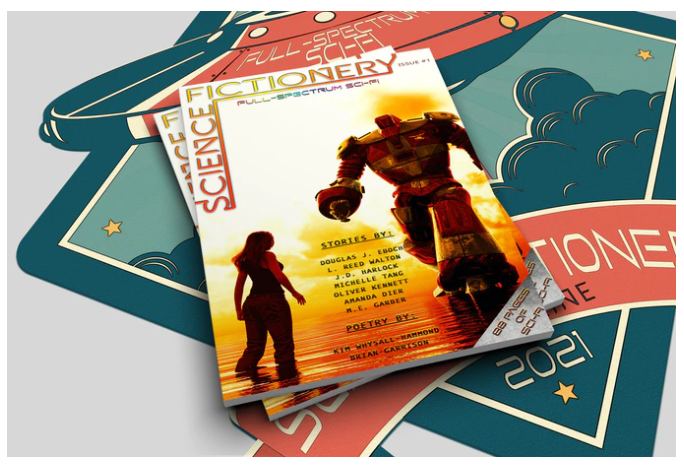
With a few days left to go in his Kickstarter campaign, David Collins was kind enough to take time to answer some questions about his ScienceFictionery magazine. If funding is successful, the publication is set to launch in August 2021.
Wes Platt: What led to the creation of the ScienceFictionery project?
David Collins: The idea of launching a science fiction literary magazine came to me around 18 months ago. I secretly plotted away for months until the idea was as mature as I could get it.
I am a lover of variety. The scope of science fiction ran across many subgenres that I thought were not being shown the light of day comparatively. I knew I wanted a magazine that offered that variety.
I had seen many projects successfully navigate the magic of crowdfunding via Kickstarter and that added a new element of excitement, potentially funding the magazine through its infancy and, at the same time, promoting it across a new platform to people who may not have happened across our magazine otherwise.
WP: What does it mean when you describe a "full spectrum sci-fi literary magazine"?
DC: This is at the very core of our ethos. It means so many things to us and Full-Spectrum Sci-Fi truly summarises what we are and what we do.
Initially it was a means to describe the fact that we publish all subgenres of science fiction, but it instantly became synonymous with our other values of diversity and equality, supporting writers who are LGBTQ+, writers of colour, neurodiverse writers and writers with disabilities.
Stories are judged on writing skill, entertainment factor, and uniqueness - NOT by the writer's race, colour, religion, sex, gender, disability, sexuality or neurophysiology.
WP: What excites you most about bringing this project to life?
DC: So many things. Running a sci-fi magazine is exciting in and of itself - discovering new talent, being the first person, besides the author, to set eyes on a new piece of fiction, supporting and promoting the writing community and filling the world with more amazing stories that excite and entertain.
WP: What's been the most daunting aspect of the Kickstarter campaign?
DC: I guess every campaign owner has hopes and dreams of their project being one of the few that accelerates way past their target and into crazyville in no time at all. We held this hope very loosely indeed. We had a great start to the campaign, reaching 30 percent in a matter of a couple of days, but then the dreaded mid-campaign slump hit. That slump is a stressful period. The campaign is in a purgatory waiting to see if it can advance further, and there’s only one thing you can do - grit your teeth and ride the storm, stay positive and focus on achieving not failing.
WP: Why do you feel such a connection to science fiction?
DC: It is the wonder and excitement of possibilities, crafting the future (or the past in some cases). As a child, I was mesmerized by movies such as Back To The Future, Howard the Duck, The Abyss, Innerspace... There are many more, but I shall refrain from naming them all. Science fiction writers, I think, keep science alive, and both excite you about a future full of amazement and wonder as well as warn you about what could come to pass. They stretch what is possible and invent or predict what could be. Though I remain disappointed we do not yet have flying cars, I think science today shows that, though we have discovered so much over the past few decades, there are more questions than answers in our universe and I think all possibilities remain, especially if you think of a multiverse where there could be a parallel universe where every decision is played out, universes where rules do not apply like they do in our universe, and the fact that scientists are yet to answer if we actually just live in a simulation.
WP: What was the first science fiction book you recall reading, when was that, and how did it affect you?
DC: The first science fiction book I ever read was The Time Machine by H. G. Wells. I think I was around 10 years old. The book was a 1986 paperback version that belonged to my older brother which I “borrowed” for a long time. At the time, I remember feeling excited by the sheer brilliance of the concept. In my mind, it was instantly possible to be able to time travel and I remember setting pen to paper to design my very own Time Machine. That didn’t work out; the plans were flawed! Haha. The rest of the book made me consider time in its enormity, its endlessness, which was pretty mind-blowing for a 10 year old.
WP: Why should people support magazines like this?
DC: Supporting independent literary magazines supports writers and helps perpetuate the art of sci-fi. A lot of magazines are non-paying markets, but they give writers a new platform to share their work. Paying magazines, like ours, reward our writers as much as we can financially and potentially will get more readers and promotion. Semi-pro and pro-rate paying magazines are often sought out by organizations such as SFWA.
WP: What advice do you have for writers who might want to submit fiction for future issues of ScienceFictionery?
DC: Dare to be different. Dare to be you. But, keep it sci-fi!
WP: What's the story behind the magazine name?
DC: Now then - it just popped into my head. I know people don't like hearing that, but it's the case with all my stories too. I cannot start a project without a name, and the name for the magazine eluded me for a long time. When the eureka moment came, it made so much sense - turning Science-Fiction into a verb just seemed to hit the nail on the head.
